Triple Negative Breast Cancer | 3 Things You Should Know
3 Things You Should Know About Triple Negative Breast Cancer
1-What is triple negative breast cancer?
Triple negative breast cancer; a term used to describe one type of breast cancer. Breast cancers are evaluated by 3 components. They are estrogen level, progesterone level, and presence of HER2. Triple negative simply means that all 3 levels are negative. This means that the tumor is not fed by estrogen, or progesterone, nor is the HER2 protein present. For this reason, triple negative breast cancers tend to be more aggressive and are more likely to spread beyond the breast. Therefore, they are more likely to have a recurrence. Likewise, five year survival rate tend to be lower in triple negative breast cancer than other types. Triple negative breast cancer represents 15-20% of all breast cancer cases.
2-Who is at risk?
Younger women aged 40-50 are more likely to be diagnosed with triple negative breast cancer, as opposed to those over the age of 60. Triple Negative Breast Cancer is 3 times more likely to occur in African American than Caucasians.
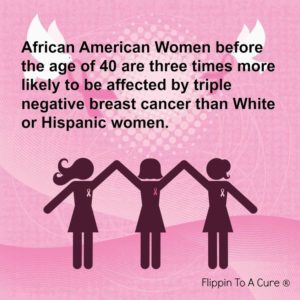
Triple Negative Breast Cancer
3-Treatment
Treatment options for triple negative breast cancer can vary. Anti-hormonal medications that block estrogen, and progesterone are not used to treat triple negative breast cancer, since these hormones are not contributing to the growth of the tumor. Triple negative breast cancer responds well to chemotherapy. Surgically, most women with this type of cancer, will elect to have a bilateral mastectomy. This means that though the cancer may be present in only one breast, women choose to have the healthy breast removed as well. The goal is to decrease the chance of developing breast cancer in the healthy breast.
All things considered, it is easy to see why triple negative breast cancer can be challenging. As a result of the prognosis, surgical intervention and treatment is typically more aggressive.
As with any information on breast cancer, it is always advised that you speak with your oncologist if you have questions or concerns. There is a lot of information available, and it can become overwhelming very easily. Though cancer cases have a lot of similarities, the way you, your loved one, or friend responds to treatment can vary.
I personally know 2 women faced with the diagnosis of triple negative breast cancer. Both of these women successfully completed their treatments and are both now on the path of survivorship.
Special prayer to my pink sisters who are triple negative breast cancer survivors.
- Published in breast cancer, triple negative breast cancer
Chemotherapy | 6 Common Side Effects
Chemotherapy, the other dreaded C word. Chemotherapy as a treatment option for breast cancer can be very scary. It is given to slow or stop the growth of these rapidly dividing cancer cells. For me, after being diagnosed with breast cancer, my fear was that I would need chemotherapy. I knew enough about the side effects of chemotherapy to know that I didn’t want any part of it. Then it hit me, the C word that turned out to be worst than hearing that you have the big C. Chemotherapy for 20 weeks! Perhaps this would be a mild version that won’t bring with it all the side effects that you hear about? Not the case!
Chemotherapy for Breast Cancer
The type of chemotherapy that is prescribed is based on the type of cancer that you have. Your cancer type is dependent on the estrogen, progesterone, and HER 2 results of your tumor. In my case my tumor was positive for estrogen, and progesterone (weak but positive), but negative for HER 2. This essentially means that estrogen and progesterone were feeding my tumor. My chemotherapy medications that were prescribed were, Adriamycin (also known as the red devil), Cytoxan, and Taxol.
March 2, 2016
This was my first chemotherapy day, but first I had an appointment at 6am that day to have my lifeport (central IV line) inserted. This was all to surreal to me. Was this really happening? It was that morning that I realized there was no turning back. I was officially starting treatment for my breast cancer. Port placed with no issues, now on to the cancer center for my first treatment. Thank god that my support system was there by my side. My husband, my mom, and my cousin.
I could barely maintain my composure while signing in for my first treatment. My cousin was right there to take over the signing in process for me. The tears would not stop falling, therefore I could no longer see the paper work that I was completing. I immediately rushed into the nearby restroom, before I totally lost it. Actually, before the door could close behind me, my mom was there to comfort me.
Chemotherapy or not?
Did I really have to do this? Technically no, I could have declined treatment. Fortunately, I forged ahead for my children. I wanted to be around as they grew up and I knew I wanted my healthy, happy life back. For this reason, I knew I what I had to do. Based on my cancer type, and treatment prognosis, I was told that I could beat this. I thought to myself, I can’t win a fight, if I never get in the ring…so through those doors I walked for my first chemotherapy treatment.
Later that night
By 8pm that same night, I felt a wave of nausea hit me like a ton of bricks. What was this? Wasn’t I told I would start experiencing side effects 2-3 days following the treatment? Regrettably, the side effects progressed to headaches, and an overall feeling of motion sickness that ABSOLUTELY NOTHING could relief for me. I often described the feeling after that first treatment as being similar to being stuck in a small canoe, in the middle of rough waters, for 3 days.
Let’s just say, it took a lot of convincing by the oncologist and encouragement by my family to get me to go back for round 2.
Common Side Effects
Side effects vary depending on the type of chemotherapy. Side effects can also vary person to person. The 6 most common side effects are;
- nausea and vomiting
- loss of appetite
- weight gain
- hair loss
- weakness
- early menopause
My Effects
Yep, you read correctly. Loss of appetite, but ironically, weight gain. What an oxymoron. Essentially I experienced every side effect listed, plus some. Multiple prescriptions were added to counter each side effect.
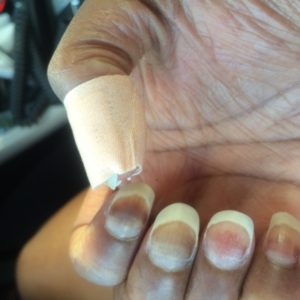
Side effect of chemotherapy. Nail beds bruised, darkened, and swollen. At the same time, also starting to lift.
Chemotherapy not only attacks the cancer cells, but also attacks healthy, normal cells as well. I developed chronic cystitis (bladder infection), along with the separation of my nails from the nail beds.
Both of which were miserable, and at times extremely debilitating.
Can you imagine going to the bathroom every 1 hour around the clock?
On top of that having to washing hands with each trip to the bathroom, with already brittle and delicate nails, some barely attached. What a horrible experience.
My tongue became discolored and looked like what I described as giraffe tongue. Meanwhile, my mouth was dry, and I had a constantly running nose.
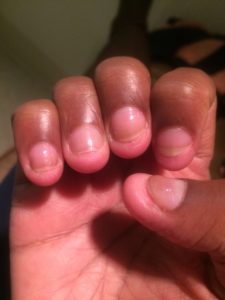 Separation from the nail beds finally stopped, and this was what was left.
Separation from the nail beds finally stopped, and this was what was left.
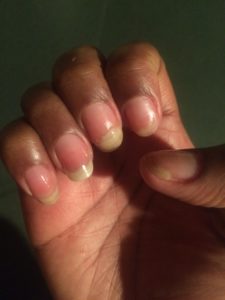
Finally, my nails are growing back!
There always seemed to be a new side effect, or a delayed reaction. Going through chemotherapy was a beast. For this reason, a piece of my heart is broken, every time I hear of someone having chemotherapy as a part of their treatment plan. Consequently, I hurt at the possibility of someone experiencing the side effects that I endured.
Side Effects Don’t Stop There
Furthermore, hair loss was such a big adjustment for me. On March 17, 2016, I said goodbye to my hair. Details about that experience will be shared in a separate post.
Of course, I share my story not to discourage you, but to encourage you through this journey. I did it. 20 weeks and all 16 of my scheduled treatments were completed. All things considered, I endured through the hardest times. I am a testimony that you can, and you will make it.
God Bless.
- Published in breast cancer, chemotherapy, side effects
My Anniversary | Breast Cancer
Today is my anniversary. The anniversary of being diagnosed with breast cancer. Invasive… Ductal …Carcinoma. I remember those words echoing in my ear as the radiologist delivered the results of my breast biopsy. That was exactly 1 year ago today. Unfortunately, this is a very different anniversary. Not an anniversary with happy memories, like of your wedding day, on your 1 year anniversary. Not even the happy memory like that of your child’s 1st birthday, as you look over the previous year in awe at their growth and advancement. But rather an anniversary that I would have been more than happy to not be celebrating today. What a huge difference one year makes.
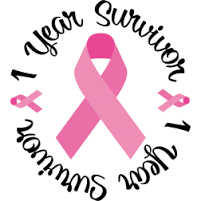
The Diagnosis
That Friday, February 5th was a typical Friday, with nothing out of the ordinary. I went to work as expected, sat though my 9am meeting not even expecting to receive biopsy results today. To my surprise following my meeting I had a missed call from the Radiologist with a voice message asking me to return her call. She sounded pretty normal to me, so I decided to return her call as I walked through the halls to my office. Just as I sat at my desk, I vividly recall the words, “your biopsy was positive”. It actually took a few seconds for me to process what she was saying. Initially I thought “positive” as in good results, right? But unfortunately that wasn’t the case. When I asked for clarification that’s when I heard the dreaded next few words …”invasive ductal carcinoma“. I didn’t know much about cancer, but I knew that invasive wasn’t good, and carcinoma meant cancer.
Yes, she was really telling me that I had breast cancer. The radiologist then recommend that I see a surgeon right away and within 2 days I had an appointment with the surgeon. During those two days of waiting I was in a daze and shed a lot of tears. Mostly tears of anxiety as well as fear of the unknown. During that time I kept asking myself, did that phone call really happen? Were those results correct? Were those my actual results?
The Surgeon Visit
Finally, time to see the surgeon to sort this all out, I thought. During the visit with the surgeon, my husband and mom were both there with me for support. And boy did I need it! The surgeon confirmed my fears, that I did in fact have breast cancer and the results were not an error. My vision was totally blurred with tears, as I listened to the surgeon describe how the testing was done assuring me that the results were accurate. I felt like I was having an outer body experience. I felt like I wasn’t really physically sitting there, but rather listening in on someone else’s results. So much information was given. I knew there was no way I could remember all this information, after all I was still focused on the fact that this diagnosis was correct. Many more tests were ordered and then a referral to the oncologist.
The Oncologist
It all happened so fast. About four more days later and the three of us were now sitting in the office of the oncologist. My prayers at this point was that I would not need chemotherapy, just a minor surgery to remove the lump and this could put this behind me. Well, unfortunately the oncologist shared with me more details about my type of cancer and the recommended treatment plan included 20 weeks of chemo, before surgery. And then radiation after that due to lymph node involvement. 20 weeks of chemo! Did he really just say 20 weeks? I remember thinking, does this doctor realize that 20 weeks was 5 months! That’s practically half the year. After clarifying with the oncologist that 20 weeks was in fact 5 months, I remember not being able to fight back the tears any longer. Was this really happening to me? I already knew some of the main side effects of chemo and quite frankly, I was terrified me.
And Today
So today I can look back on the last 365 days and say that I made it. Never did I think I would make it back to a place of emotional stability. However, don’t misunderstand, I still have days that I can’t help but cry when I think about my journey. Those are no longer tears of sadness, but rather tears of amazement and victory. There were so many days, that I honestly didn’t know how, or if I could make it. Such a major lifestyle change. Hurdle after hurdle. As soon as I overcame one side effect of the toxic regimen that I was receiving, another side effect would rear its ugly head. I felt like I couldn’t catch a break. I sometimes felt defeated. There were many days that the emotional and psychological battle was by far tougher than the physical challenges. Some days were debilitating, some days sad, some days in pain, some days just flat out miserable. But today, I can say that those days are behind me. I feel almost whole again. Though I still have reconstruction surgery ahead of me, one year later, I am cancer free. I really made it!
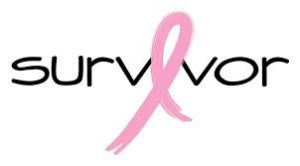
For anyone out there on this journey, or helping a loved one or friend through this, just take one day at a time. It is far too overwhelming to take in the entire journey. One day, you too will have an anniversary. That day when you will have a story to tell, about your own journey.
I pray for continued healing and peace.
- Published in breast cancer, Diagnosis, Types of Breast Cancer
Breast Cancer Diagnosis; Questions to Ask
From the moment that you received your breast cancer diagnosis, you probably felt like your whole life had been flipped upside down. If you are anything like me, initially in those first few moments you felt totally numb and in disbelief.
Many questions began to race through your head. Is this accurate? Do they need to repeat the biopsy? Will I just need surgery? Has it spread? What does this diagnosis really mean? While your mind is still processing everything, you may have that initial doctors appointment and not know what questions you should ask.
First of all you should know these are all normal feelings. Almost everyone I have spoken to regarding this subject went through these same emotions. Because you will feel overwhelmed, here are a few important questions to ask initially to help you better understand your diagnosis and treatment plan.
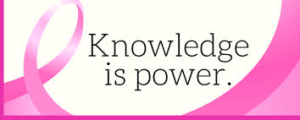
8 Important Questions to Ask Your Physician After Breast Cancer Diagnosis;
1-Is my cancer invasive or in situ?
Invasive cancer have infiltrated outside of the milk duct or lobes, while in situ is still contained within ducts or lobes.
2-What are the results of estrogen, progesterone, and HER2 testing?
These are tests that are performed on the tumor to tell if it is being fed by hormones or contain the protein HER2. Women naturally make the hormones estrogen and progesterone. HER2 positive tumors grow and spread faster than other tumors. Your treatment options will be dependent on these results and aimed toward the hormones and/or HER2 receptors.
3-Will I need to see a medical oncologist?
The medical oncologist is the doctor who will manage your chemotherapy. Chemotherapy may or may not be a part of your treatment plan.
4-Will my treatment include chemotherapy?
Chemotherapy can include oral or IV treatments. Chemo can be given on different schedules, such as weekly, biweekly, or every 3 weeks. The number of chemo treatments needed will depend on your cancer type and the chemo medication that is ordered.
5-Are there any signs of lymph node involvement?
These are the lymph nodes under your arm on the side of the affected breast. They can sometimes be felt manually by the doctor or may only be detected by ultrasound. This typically applies to invasive cancers only. Radiation treatment may be recommended if cancer has spread to your lymph nodes.
6-Will my treatment include radiation?
Radiation is typically done in addition to surgery, and is also indicated when lymph nodes are involved.
7-Will genetic testing be ordered ?
The genetic testing for breast cancer is called BRCA testing. This testing is helpful in determining your risk for reoccurrence of breast cancer, or possibility of passing the gene mutation on to your children (female and male).
8-What stage is my breast cancer?
Breast cancer stages range from 0-4. You will find that there are several factors that determine the stage of your cancer. This includes the size of your tumor, whether your lymph nodes are involved and whether there is metastasis, or spread of the cancer.
Because you may be flooded with emotions after your breast cancer diagnosis it may be hard to know what to ask. Consequently, there may be other questions that you may want to ask your physician. You should make a list of all the questions to ask your physician as they come up. It is also a good idea to have another person with you to help remember the answers that your physician gives to each of these questions. My husband attended every appointment with me, and often times we would still walked away and had different memories of what the doctor said.
Finally, remember that “cancer” is a word not a sentence. While you may feel discouraged and overwhelmed at first, it is especially important for you to learn as much as possible about your cancer and treatment recommendations. Having adequate information will help to decreases your anxiety, therefor also decreasing the fear of the unknown.
Good luck on your journey.
- Published in breast cancer, Diagnosis
Why The Title Simple Pink Ribbon?
Why the title Simple Pink Ribbon? Some of you may be asking why did I choose this title?

First of all, make no mistake, there was nothing “simple” about my breast cancer journey. As a matter of fact, this process was anything but simple. Personally, I describe the journey as the hardest, most complicated thing I have EVER done in my ENTIRE life, hands down!
So you ask again, why Simple Pink Ribbon?
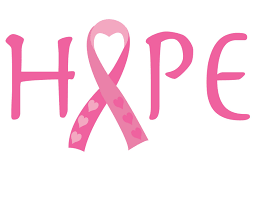
As you may know, the pink ribbon represents breast cancer awareness and hope. It is my goal to EDUCATE, ENCOURAGE, and EMPOWER anyone who is going through this devastating diagnosis. As a result, whether you yourself, a loved one, or friend, has been diagnosed, I want to provide you with information to encourage you through this process. Therefore, in the end you will be more knowledgeable and empowered as you steer through your own journey.
So why Simple Pink Ribbon?
I would like to help you navigate through this treacherous process, in a more SIMPLE way. It probably seems like all you hear is complicated, hard to understand, “medical talk” along the way. However, let’s just keep it SIMPLE here.
This is a place that you can use as a resource to help guide you through your breast cancer journey. This site is designed for the person who is diagnosed with breast cancer, their family, or friends. I know first hand that the emotional roller coaster of dealing with breast cancer is not only hard on the person diagnosed with breast cancer, but also on those closest to them. I invite you all to share in my journey to remind you that you are not alone. As I share my story, I want to wish you good luck on your journey as well.
- Published in breast cancer, Pink Ribbon
